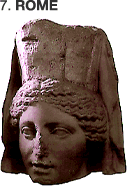
THE GREAT MOTHER
A stone head of the Great Mother. One of the most exotic deities introduced into Rome was the Great Mother (Magna Mater), borrowed from Asia Minor (modern Turkey) in 204bc.
Many Roman writers described her arrival in Rome and the fantastic events thet surrounded it. The following account is drawn largely from the poet Ovid, writing in the 1st century bc. Hoping for victory in their war against the Carthaginians under Hannibal, the Romans consulted a local oracle, which gave a strange response: "The mother is absent: seek the mother. When she comes, she must be received by chaste hands." Puzzled, they applied to the Greek oracle at Delphi for a second opinion, and the oracle advised that they should "fetch the mother of the gods, who is to be found on Mount Ida". So they sent an embassy to King Attalus, in whose territory Mount Ida stood, and asked if they might remove the cult image of the Great Mother to Rome. Attalus refused permission, but then the godess herself miraculously spoke, saying that it was her own wish to go. Awed by these words, the King gave his consent and a boat was then built to carry the precious cargo.
The long voyage across teh Mediterranean ended at Ostia, Rome's port at the mouth of the Tiber, where all the citizens came to greet the goddess. Men tried to pull the boat to shore, but it was grounded on a mudbank and could not be shifted. The Romans were afraid they would not be able to fulfil the terms of the oracle, but then Claudia Quinta came forward - a noblewoman who was wrongly accused of being unchaste, on the grounds that she dressed too elegantly and had too ready a tounge in arguments with men. Knowing herself to be innocent she stepped onto the river mouth and held up her hands in prayer to the Great Mother. "If I am innocent of all charges," she exclaimed, "yield, goddess, to my chaste hands." She then drew in the boat effortlessly, and the cult image was escorted to it's new temple. The Romans always had mixed feelings about the great mother. On the one hand, her ecstatic cult, with it's self-castrated priests, wild music and dancing, seemed foreign in character. Onthe other hand, because her homeland near troy was the ultimate origin of the Roman race (according to the Aeneas legend), she was seen as a "native" deity.